- Kenmore refrigerator water filters
- Whirlpool refrigerator water filters
- Samsung refrigerator water filters
- GE refrigerator water filters
- LG refrigerator water filters
- Frigidaire refrigerator water filters
- KitchenAid refrigerator water filters
- Maytag refrigerator water filters
- Kenmore Elite refrigerator water filters
- Estate refrigerator water filters
- GE Profile refrigerator water filters
- Amana refrigerator water filters
- Bosch refrigerator water filters
- Dacor refrigerator water filters
- Electrolux refrigerator water filters
Refrigerator water filters: why quality matters
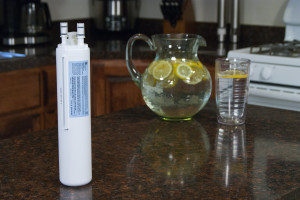

Shop online for a refrigerator water filter, and you’ll notice a big price range for what seems to be the same filter.
At the high end are brand-name water filters offered by the refrigerator manufacturer—Kenmore, Whirlpool, Samsung, LG, Frigidaire and other familiar brands.
On the low end are brand-name water filters listed by sellers other than the manufacturer, as well as off-brand water filters sold as being compatible with a brand-name water filter.
So what’s the difference? Quality and reliability—and in some cases, authenticity.
The risk with cheap water filters
It’s tempting—so tempting—to buy the lowest-priced water filter. Unfortunately, that’s a risky strategy, because you can’t be sure that the water filter actually removes contaminants that might be in your water supply. Nor can you be sure that the filter is constructed to the standards of the original manufacturer to be free of BPA, to deliver water at the promised flow rate and to filter the promised number of gallons before you have to replace it.
Here, briefly, is why not to buy an off-brand filter or a brand-name filter sold by anyone other than the manufacturer:
Off-brand filters—those sold as compatible with brand-name filters—don’t go through the same testing the brand-name filters do. While off-brand filters can be tested for contaminant removal and structural integrity, they aren’t tested for how well they work within the refrigerator. In fact, according to Consumer Reports, it can be difficult to find an after-market filter that has been tested at all.
Counterfeiters have flooded online marketplaces with low-quality water filters that look like trusted brands. Because you can’t always tell a fake by looking at it, the only way to be sure you’re getting an authentic filter is to buy it on the manufacturer’s site or from the manufacturer's brand store on a marketplace site.
A quick look at refrigerator water filter certification
Independent non-profit organizations test water filters to make sure the filters actually remove the contaminants as claimed. They also test that the filters are structurally sound and meet minimum requirements for water flow.
The most widely known certification organization is NSF International. Certified filters bear the NSF logo, and don’t just say “tested to NSF standards.”
Water filters are most often tested for one or more of these three NSF certification standards.
Standard 42 for aesthetic effects. The water filter removes microscopic particles of dirt, chlorine taste and odor, and some lead. Standard 42 is divided into six classes based on the size of the particles the filter traps. All classes except classes I and II also filter out the Cryptosporidium cyst, a parasite that poses a serious health risk for people with compromised immune systems.
Standard 53 for health effects. The water filter traps more lead than filters rated for standard 42, as well as other heavy metals. It also removes volatile organic compounds (VOCs), asbestos and Cryptosporidium cysts.
Standard 401 for emerging contaminants. The water filter removes at least one of the 15 chemicals in a new contaminants category. These chemicals—mostly medications and pesticides—have been found in trace amounts in some drinking water supplies. They’re called “emerging” contaminants because they’re a new cause of concern. The health effects of these contaminants have yet to be determined.
Most common symptoms to help you fix your refrigerators
Choose a symptom to see related refrigerator repairs.
Main causes: control board or cold control failure, broken compressor start relay, compressor motor failure, defrost tim…
Main causes: jammed ice cubes, broken ice maker assembly, dirty water filter, kinked water line, bad water valve, freeze…
Main causes: water valve leaking, frozen or broken defrost drain tube, overflowing drain pan, cracked water system tubin…
Main causes: damaged door seal, faulty defrost sensor or bi-metal thermostat, broken defrost heater, bad defrost timer o…
Main causes: blocked vents, defrost system problems, evaporator fan failure, dirty condenser coils, bad sensors, condens…
Main causes: blocked air vents, compressor problems, condenser or evaporator fan not working, control system failure, se…
Main causes: leaky door gasket, defrost system failure, evaporator fan not running, dirty condenser coils, condenser fan…
Things to do: clean condenser coils, replace the water filter, clean the interior, adjust doors to prevent air leaks, cl…
Most common repair guides to help fix your refrigerators
These step-by-step repair guides will help you safely fix what’s broken on your refrigerator.
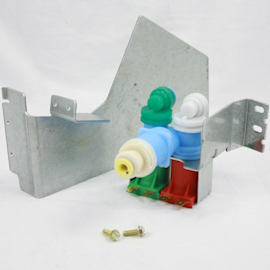
How to replace a refrigerator water valve
Replace the water valve that feeds water to the ice maker and water dispenser if it no longer controls the flow of water…
Repair difficulty
Time required
15 minutes or less

How to clean refrigerator condenser coils
Help your refrigerator run more efficiently by cleaning the condenser coils. It's easy and takes just a few minutes.…
Repair difficulty
Time required
15 minutes or less
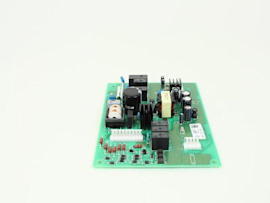
How to replace a refrigerator temperature control board
If the temperature in your refrigerator doesn't match the temperature you set, the problem could be the temperature cont…
Repair difficulty
Time required
30 minutes or less
Effective articles & videos to help repair your refrigerators
Use the advice and tips in these articles and videos to get the most out of your refrigerator.
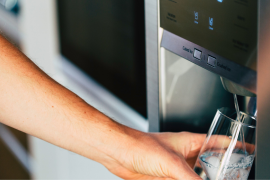
No matter what style Maytag refrigerator you have, we can walk you through replacing the water filter.…

Learn about all the convenient features on our Sears PartsDirect website that make your parts purchases easier.…
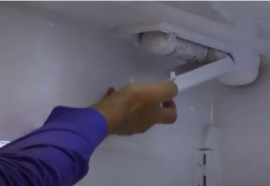
Get tips and advice on replacing the water filter in your LG refrigerator.…